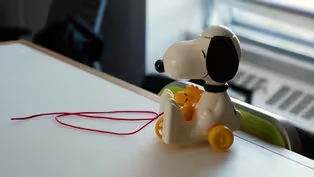
Building a Future
Clip: Season 5 Episode 50 | 10m 4sVideo has Closed Captions
Crossroads RI, known for homeless shelters is now also focusing on more permanent housing.
Crossroads RI is often known for its homeless shelters. But the organization is most focused on building apartments, so people have permanent housing. We sat down with Michelle Wilcox, the president and CEO, to talk about Rhode Island’s housing crisis ahead of the winter.
Problems playing video? | Closed Captioning Feedback
Problems playing video? | Closed Captioning Feedback
Rhode Island PBS Weekly is a local public television program presented by Ocean State Media

Building a Future
Clip: Season 5 Episode 50 | 10m 4sVideo has Closed Captions
Crossroads RI is often known for its homeless shelters. But the organization is most focused on building apartments, so people have permanent housing. We sat down with Michelle Wilcox, the president and CEO, to talk about Rhode Island’s housing crisis ahead of the winter.
Problems playing video? | Closed Captioning Feedback
How to Watch Rhode Island PBS Weekly
Rhode Island PBS Weekly is available to stream on pbs.org and the free PBS App, available on iPhone, Apple TV, Android TV, Android smartphones, Amazon Fire TV, Amazon Fire Tablet, Roku, Samsung Smart TV, and Vizio.
Providing Support for PBS.org
Learn Moreabout PBS online sponsorshipso muchfor sitting down with me.
- Thank you.
- You have been president and CEO of Crossroads Rhode Island for about six months now, but you've worked here for a very long time.
So tell me what is your vision for Crossroads, sort of in the immediate, and then also in the long term?
- The immediate plans really are, we have a very ambitious and exciting housing development plan in place.
We are under construction right now for the Summer Street Apartments.
It's 176 one-bedroom apartments that's slated to be completed next year.
We have a first of its kind in Rhode Island, a health and housing facility at 371 Pine Street that's gonna begin construction very shortly, within the next couple of months.
So we have about 300 new apartments that are in the immediate pipeline.
- [Steph] Many people think of Crossroads for its shelter system, but the majority of the people they serve are placed in permanent apartments owned and operated by the agency.
- Emergency shelter is absolutely a necessary part of the solution to address homelessness, but permanent housing is the only solution, the only real solution to homelessness.
And so that's where we focus.
- Between the permanent housing and the shelters, you have the capacity to serve roughly 2,000 people at a time.
How does that compare to the total need in Rhode Island?
Are we really crunched?
Are there fewer beds available than individuals experiencing homelessness?
- Yes.
The number of people experiencing homelessness in Rhode Island has really skyrocketed since the pandemic.
So the number of folks that have experienced homelessness in Rhode Island this year is probably about 7,000, and that's double what it was in 2019.
Annually, Crossroads serves about 4,000 people.
So of those 7,000 we're gonna, you know, serve about 4,000 of them this year.
And the need is great and growing, unfortunately.
You know, the homelessness crisis in our state, but also in the country; everywhere in the country has really gotten so much worse since the onset of the pandemic.
- And how full are your shelters?
You know, is there a wait every day for people to get in, or could individuals, you know, where we are here near Downtown Providence, there's a lot of individuals sleeping on the street, would they be able to get into one of your shelters tonight?
- So unfortunately, the shelters across the state are always full.
And so there are waits for shelter.
And that's why one of the programs that we operate is called Housing Problem-Solving.
And it's why it's so critically important.
Housing Problem-Solving helps folks who are experiencing homelessness, maybe skip that shelter placement and go directly to housing.
Emergency shelter is absolutely a necessary piece of the overall solution, but other programs like Housing Problem-Solving, and frankly, an unrelenting focus on building more affordable housing is what all of those things are needed to solve the problem.
- [Steph] Crossroads is well-known for the tower at its Broad Street headquarters, visible from the highway, which is officially called Travelers Aid Housing.
Crossroads is planning to completely empty that tower and turn it into apartments.
- Travelers Aid Housing was formally the YMCA, and so there are 176 nine x 11 rooms.
There are no kitchens, there's no recreation or living space.
It's shared bathrooms.
So Summer Street Apartments is really exciting, because everyone who's living in the Travelers Aid Housing, when Summer Street is complete, will move in, and they'll have a complete one-bedroom apartment.
And then that will enable us to undertake a renovation of the Travelers Aid Housing, turning those 176 rooms into about 80 new apartments.
- Do you think that model of single-room occupancy housing is sort of over?
- Absolutely.
It's not how anyone should live.
And in fact, during the pandemic, I'm so grateful that we did not have really significant loss of life.
When you think about people living in those close quarters and some of the really terrible outcomes that happened in other congregate living situations, think nursing homes and places like that where you have that many people so closely living together, it's not a good solution for permanent housing.
And especially when you think about the folks that we're serving, many of the people that we serve have pretty significant mental health concerns, often substance use challenges, other health conditions.
And so having their own apartment where they can prepare meals for themselves, and can really have the space that we all have in our homes is really important.
- Is the idea for them to eventually get out of the Crossroads-owned apartments, or can they live there indefinitely?
- So it really depends on the individual.
Permanent housing is just that: folks can stay permanently.
For some individuals, households, families, they may stay with us for a period of time, a number of years, and then their situation changes.
They no longer have the need for the wraparound services and supports.
And so they will go live in other housing.
For some of our clients though, or residents, they may stay with us, you know, for their whole lives.
And that's okay.
- I want to ask you about a project that is not a Crossroads project, but the Pallet shelters that were supposed to open in Providence.
The idea was that these were going to be sort of rapid housing that you could deploy.
But they were supposed to open in March, and here we are in December, and there have been permitting issues and fire code issues and they're still not open.
Is there just too much red tape to get help for homeless individuals in Rhode Island?
- I really can't comment on the specifics of that program.
It's not something that Crossroads is directly involved in.
But I will say that it can be challenging when government dollars are involved, because there's another level of regulation that I think happens: rightly so.
We want to make sure that public dollars are being spent properly and wisely, but sometimes it does add a layer of complexity that you wish, you know, wasn't there.
- There was a story recently in Johnston, there's a 250-unit affordable housing development proposed.
And a planning department member said, "This project is the future Chad Brown of Johnston."
And that was him opposing the project; of course, Chad Brown, the well-known public housing community in Providence.
How do we break this stigma that having affordable housing in your community is somehow a bad thing?
- I think people don't often realize that affordable housing is something that they may have benefited from at a point in their lives, or that their neighbors or their children or, you know, their coworkers or the person who, you know, is serving them their coffee in the morning.
Affordable housing just means that it's housing that is affordable for people at different income levels and at lower income levels.
Affordable housing, public housing, is not today what it was 30 or 40 years ago.
I think we have learned a lot in the business of housing and creating housing that is attractive, that is suitable, it's safe.
And while sometimes large developments are certainly much more cost-effective, Crossroads owns and operates housing throughout the city of Providence that you would never know is Crossroads and would never know it's affordable housing, right?
So I think helping folks to understand who the folks are that are going to live in this housing, and that it's really, it's your neighbors, it's your friends, it's, you know, people just like me and you.
- What do you make of the sort of new-ish housing department that's had a bunch of missteps that have been well-reported, is now on its third secretary in two years.
Do you think that this experiment, I guess, has been successful so far?
- We were absolute advocates for creating a housing department and a housing secretary, having someone at the cabinet level whose focus is on housing, and by extension, homelessness, is incredibly important.
I'm looking forward to seeing what the new housing secretary is going to, you know, state for her vision and goals.
We are here to support that work.
And, you know, I'm hopeful that third time's the charm.
Video has Closed Captions
Clip: S5 Ep50 | 8m 37s | Go behind the scenes at the Trinity Rep. costume shop. (8m 37s)
Video has Closed Captions
Clip: S5 Ep50 | 5m 12s | The toy designer behind Mr. Potato Head and My Little Pony gives us his take on toys. (5m 12s)
Providing Support for PBS.org
Learn Moreabout PBS online sponsorship
- News and Public Affairs

Top journalists deliver compelling original analysis of the hour's headlines.

- News and Public Affairs

FRONTLINE is investigative journalism that questions, explains and changes our world.












Support for PBS provided by:
Rhode Island PBS Weekly is a local public television program presented by Ocean State Media

